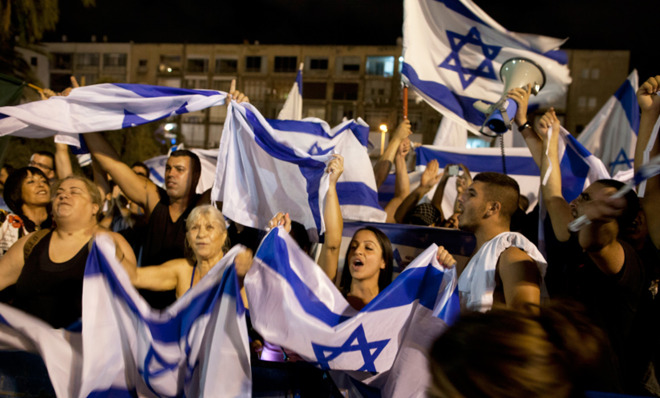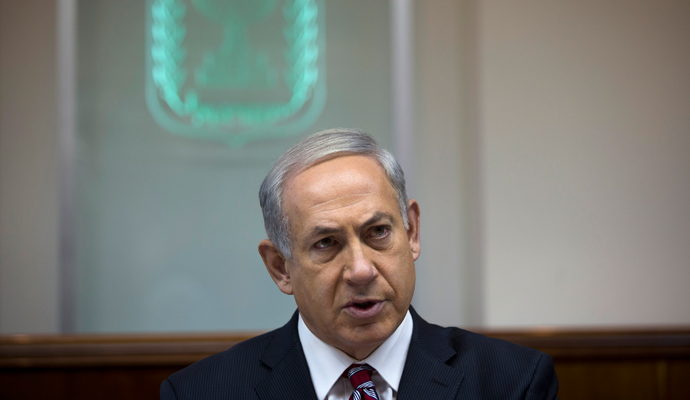How Israel's hawks intimidated and silenced the last remnants of the anti-war left
This time, public dissent hasn't just been silenced, it's been all but smothered

A free daily email with the biggest news stories of the day – and the best features from TheWeek.com
You are now subscribed
Your newsletter sign-up was successful

TEL AVIV — Pro-war demonstrators stand behind a police barricade in Tel Aviv, chanting, "Gaza is a graveyard." An elderly woman pushes a cart of groceries down the street in the southern Israeli city of Ashkelon and asks a reporter, "Jewish or Arab? Because I won't talk to Arabs." A man in Sderot, a town that lies less than a mile from Gaza, looks up as an Israeli plane, en route to the Hamas-ruled territory, drops a blizzard of leaflets over the town. "I hope that's not all we're dropping," he says.
Even before the war, Israel was shifting right, as an increasingly strident cadre of politicians took ownership of the public debate on security and foreign affairs. But the Gaza conflict has accelerated the lurch — empowering nationalistic and militant voices, dramatically narrowing the space for debate, and eroding whatever public sympathy remained for the Palestinians.
The fighting will leave behind a hardened Israeli public opinion: There is a widespread feeling that Israelis are the true victims here, that this war with a guerrilla army in a besieged territory is existential.
The Week
Escape your echo chamber. Get the facts behind the news, plus analysis from multiple perspectives.

Sign up for The Week's Free Newsletters
From our morning news briefing to a weekly Good News Newsletter, get the best of The Week delivered directly to your inbox.
From our morning news briefing to a weekly Good News Newsletter, get the best of The Week delivered directly to your inbox.
Hawkish Prime Minister Benjamin Netanyahu has found himself under pressure from politicians even further to his right. The premier has suspended negotiations with the Palestinian Authority, arrested more than 1,000 Palestinians, demolished the homes of several people convicted of no crimes, and launched an offensive in Gaza that has killed more than 1,800 people. That's not enough, even for some members of Netanyahu's own party, who see worrying signs of weakness.
"We've seen the influence of [Tzipi] Livni over the prime minister," Likud Knesset member Danny Danon told Foreign Policy, referring to the justice minister and her centrist party. "My position is to make sure we're not becoming a construct of the left.... As long as he stays loyal, he'll have the backing of the party."
(More from Foreign Policy: How to fix it)
Netanyahu fired Danon from his post as deputy defense minister last month, because he was too critical of the government's strategy in Gaza. But Danon cannot be dismissed as a marginal figure: He took control of the Likud central committee last year, and has used the post to steer the party further right — an ironic turnabout, as Netanyahu used the same tactics to drive out former Israeli Prime Minister Ariel Sharon a decade ago.
A free daily email with the biggest news stories of the day – and the best features from TheWeek.com
Even before his election, the 2012 Likud primary turned Netanyahu into perhaps the most liberal member of his own party.
Public opinion polls confirm the Israeli right's gains during the current conflict. A survey conducted by the Knesset Channel recently found that the right-wing parties would win 56 seats in the next election, up from 43 last year. The center-left bloc would shrink from 59 seats to 48. Other surveys suggest that the right could win a majority by itself, without needing religious parties or centrists to form a coalition.
But perhaps more striking is the public's near-unanimous support for the Gaza war, from Israelis across the political spectrum. Roughly 90 percent of Jewish Israelis support the war, according to recent polls. Less than 4 percent believe the army has used "excessive firepower," the Israel Democracy Institute found, though even Israeli officials admit that a majority of the 1,800 Palestinians killed so far are civilians.
Meanwhile, Labor Party leader Isaac Herzog, the ostensible head of the opposition, is doing public relations work for Netanyahu, defending the war at a gathering of foreign diplomats. Livni herself at times sounds more hawkish than the prime minister, arguing that Israel should topple Hamas and build a moat to separate itself from Gaza. "I have two words for you: Get lost," she told the U.N. Human Rights Council after it voted to investigate possible Israeli war crimes in Gaza.
And Finance Minister Yair Lapid, who once threatened to bolt the coalition if talks with the Palestinians collapsed, has been another vocal advocate. "This is a tough war, but a necessary one," he said last month.
Decades ago, a commentator coined the phrase "quiet, we're shooting" — a reflection of the Israeli public's tendency to rally behind the army in wartime. But this time, public dissent hasn't just been silenced, it's been all but smothered. A popular comedian was dumped from her job as the spokeswoman for a cruise line after she criticized the war. Local radio refused to air an advertisement from B'Tselem, a rights group, which simply intended to name the victims in Gaza.
(More from Foreign Policy: The war within Gaza)
Scattered anti-war rallies have drawn small crowds, mostly in the low hundreds; the largest brought several thousand people to Tel Aviv on July 26. But most of the protests ended in violence at the hands of ultranationalists, who attacked them and set up roving checkpoints to hunt for "leftists" afterwards. Demonstrators have been beaten, pepper-sprayed, and bludgeoned with chairs.

In hundreds of interviews with Israelis over the past month, there has been little criticism of their government's actions, much less sympathy for Gaza's. "We have suffered terribly, but when you are pushed into a corner, you have no choice," said one man in Ashkelon. "Their children? What about our children? If they cared about their children, they wouldn't have chosen Hamas," said a woman in Kiryat Malachi, a city in Israel's south.
The media, by and large, has become a unanimous choir in support of destroying Hamas. The only exception is Haaretz, where Gideon Levy, one of the newspaper's best-known columnists, has started reporting with a bodyguard after he was accosted during a live television interview in Ashkelon. Yariv Levin, a Knesset member from Likud and a chairman of the governing coalition, wants to charge Levy with treason because of his writing.
"I've never had it so harsh, so violent, and so tense," Levy said.
"We will face a new Israel after this operation ... nationalistic, religious in many ways, brainwashed, militaristic, with very little empathy for the sacrifice of the other side. Nobody in Israel cares at all."
Already, figures who challenge Israel's dominant narrative about the conflict — or even dare to tweak public sensibilities — have been met with an overwhelming and vicious backlash. Last week, Hanoch Sheinman, a law professor at Bar-Ilan University, emailed his students about their revised exam schedule. He opened by wishing "that you, your families and those dear to you are not among the hundreds of people that were killed, the thousands wounded, or the tens of thousands whose homes were destroyed."
The dean of the law school pronounced himself shocked at Sheinman's email, and wrote to students that Sheinman's "hurtful letter ... contravene[s] the values of the university."
"Even this trivial expression of concern stirred such a backlash, and that's not trivial at all," Sheinman told Foreign Policy. "To be shocked or angered ... by a trivial expression of sympathy to everyone is to betray a lack of such sympathy."
(More from Foreign Policy: The case against the prosecution)
Even in the Knesset, voices of dissent have been silenced. Knesset member Hanin Zoabi, a Palestinian citizen of Israel who is a favorite target for the right, has been barred from most parliamentary activity for six months. Her punishment, the harshest one meted out by the Ethics Committee, was a response to a radio interview in which she said the June 12 kidnapping of three Israeli teenagers was not terrorism. "The atmosphere has become very radical," said Basel Ghattas, a colleague of Zoabi's.
On the other side of the political spectrum — and dominating the conversation — are people like Moshe Feiglin, a clownish figure from Likud and a deputy speaker of parliament. He recently called for the "conquest" of Gaza, and the "elimination of all military forces and their supporters." This is our land, he wrote, "only ours, including Gaza." Nobody has demanded his censure.
Though this current bout of fighting in Gaza may soon end, Israel's rightward turn appears here to stay. The deaths of more than 60 Israeli soldiers in the conflict have not dented public support for the war; if anything, it appears to have whet many Israelis' appetite for vengeance.
At a funeral last month, hundreds of mourners sobbed softly as the flag-draped coffin of an Israeli officer was brought into the cemetery. The soldier's mother lay her head on the coffin, refusing to let an honor guard lower it into the grave; steps away, the officer's pregnant wife consoled his anguished father, who wore a torn black shirt in accordance with Jewish custom. Next to the grave was another freshly dug plot.
One young woman, a casual acquaintance of the officer's, leaned on the metal police barricades ringing the gravesite."We should kill 100 of theirs for every one of ours," she said.
-
 How the FCC’s ‘equal time’ rule works
How the FCC’s ‘equal time’ rule worksIn the Spotlight The law is at the heart of the Colbert-CBS conflict
-
 What is the endgame in the DHS shutdown?
What is the endgame in the DHS shutdown?Today’s Big Question Democrats want to rein in ICE’s immigration crackdown
-
 ‘Poor time management isn’t just an inconvenience’
‘Poor time management isn’t just an inconvenience’Instant Opinion Opinion, comment and editorials of the day